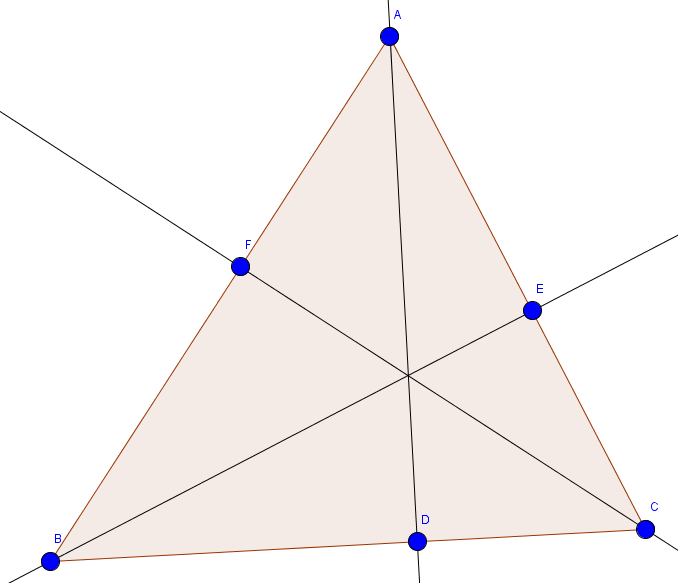Find the altitude!
 A
D
,
B
E
,
C
F
are the three altitudes of the triangle
A
B
C
.
If
A
D
=
4
and
B
E
=
5
,
find the sum of all possible integer value of
C
F
.
A
D
,
B
E
,
C
F
are the three altitudes of the triangle
A
B
C
.
If
A
D
=
4
and
B
E
=
5
,
find the sum of all possible integer value of
C
F
.
The answer is 187.
This section requires Javascript.
You are seeing this because something didn't load right. We suggest you, (a) try
refreshing the page, (b) enabling javascript if it is disabled on your browser and,
finally, (c)
loading the
non-javascript version of this page
. We're sorry about the hassle.
2 solutions
Did the same way!...+1
Shouldn't you at least check that a triangle exists with, for example, C F = 3 and C F = 1 9 ?
Log in to reply
Is there another way to check it? I thought that we proved that 9 2 0 < C F < 2 0 is enough
Log in to reply
You have showed that the altitude C F must lie between 2 0 / 9 and 2 0 . You have not showed that any value in this range can be the third altitude of a suitable triangle.
Since you can determine the three sides of a triangle from the values of the altitudes, however, this is not that difficult. Can you find the formula for the area of a triangle in terms of its three altitudes? From there, it is simple to get the three sides.
Log in to reply
@Mark Hennings – Ok :) I'm trying to find it. I realized that I couldn't determine the value of three sides of the triangle from the value of the altitudes , i trying with finding the sides of the triangle with altitudes 4 , 5 , 6 and end up with the ratio of the three sides will be in 1 5 : 1 2 : 1 0 but it is not possible that the sides of the triangle are 1 5 , 1 2 , 1 0
Log in to reply
@Dexter Woo Teng Koon – If A is the area of the triangle, then h a = a 2 A h b = b 2 A h c = c 2 A Plug these into Heron's formula for the area, and you get A = h 2 ( h a − 2 h ) ( h b − 2 h ) ( h c − 2 h ) h a h b h c where h − 1 = h a − 1 + h b − 1 + h c − 1 The requirement that h a , h b , h c must all be bigger than 2 h give the desired range for h c , given h a = 4 and h b = 5 .
@Mark Hennings – I would like to know how did you solve this problem :)
Let CF=f.
From Triangular Inequality,
I
f
f
i
s
s
h
o
r
t
e
s
t
,
f
2
∗
A
r
e
a
t
h
e
l
o
n
g
e
s
t
s
i
d
e
.
∴
4
1
+
5
1
≥
f
1
.
⟹
f
≥
9
2
0
.
F
o
r
i
n
t
e
g
e
r
f
,
f
>
2
.
I
f
f
i
s
l
o
n
g
e
s
t
e
s
t
,
f
2
∗
A
r
e
a
t
h
e
s
h
o
r
t
e
s
t
s
i
d
e
.
∴
4
1
−
f
1
≤
5
1
.
⟹
f
≤
1
2
0
.
F
o
r
i
n
t
e
g
e
r
f
,
f
≤
1
9
.
So f can take the value of all integers from 3 to 19
S
u
m
=
k
=
3
∑
1
9
k
=
2
(
1
9
−
3
+
1
)
∗
(
1
9
+
3
)
=
1
8
7
.
A B × C F = 4 B C = 5 A C
A B + A C > B C
A B + 5 A B × C F > 4 A B × C F
2 0 A B + 4 ( A B × C F ) > 5 ( A B × C F )
2 0 A B > A B × C F
2 0 > C F
A C + B C > A B
5 A B × C F + 4 A B × C F > A B
4 ( A B × C F ) + 5 ( A B × C F ) > 2 0 A B
9 ( A B × C F ) > 2 0 A B
C F > 9 2 0
∴ The sum of all possible integer value of C F is 2 3 + 1 9 × 1 7 = 1 8 7